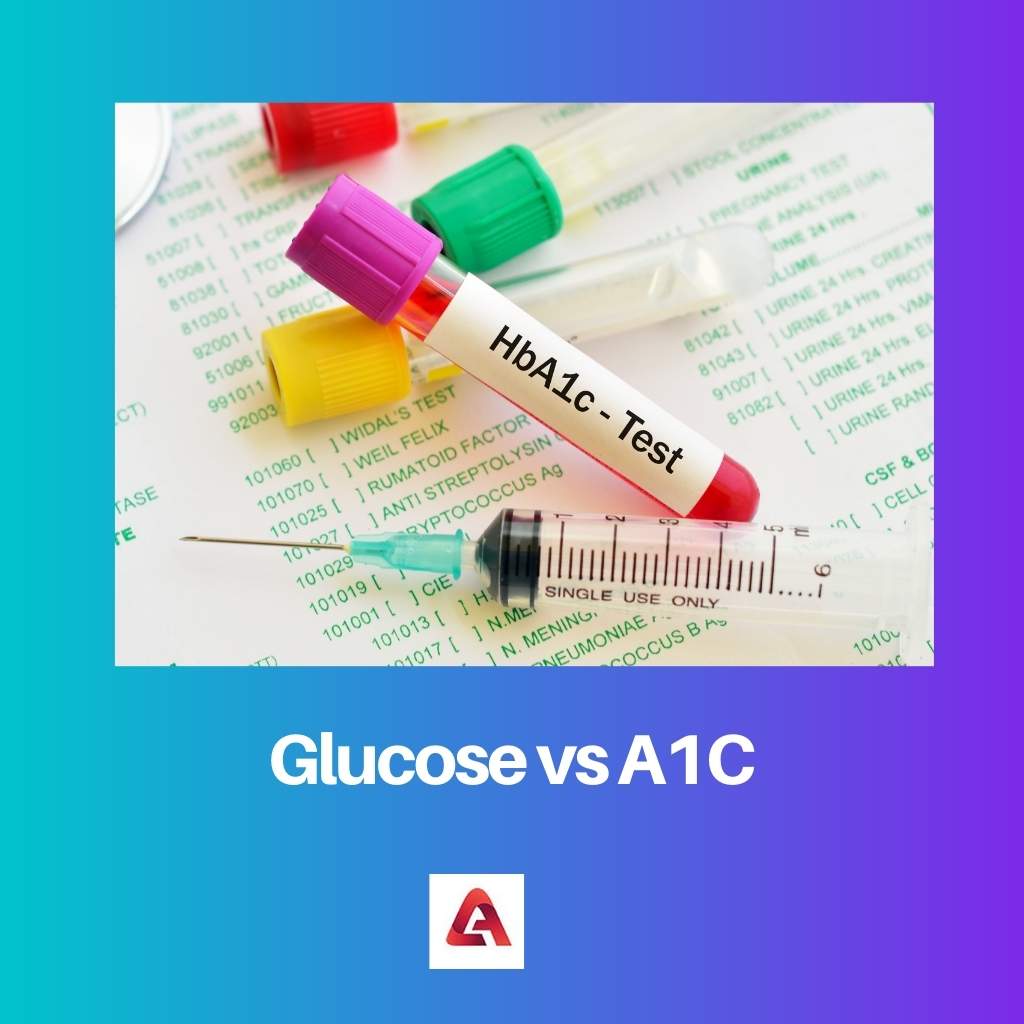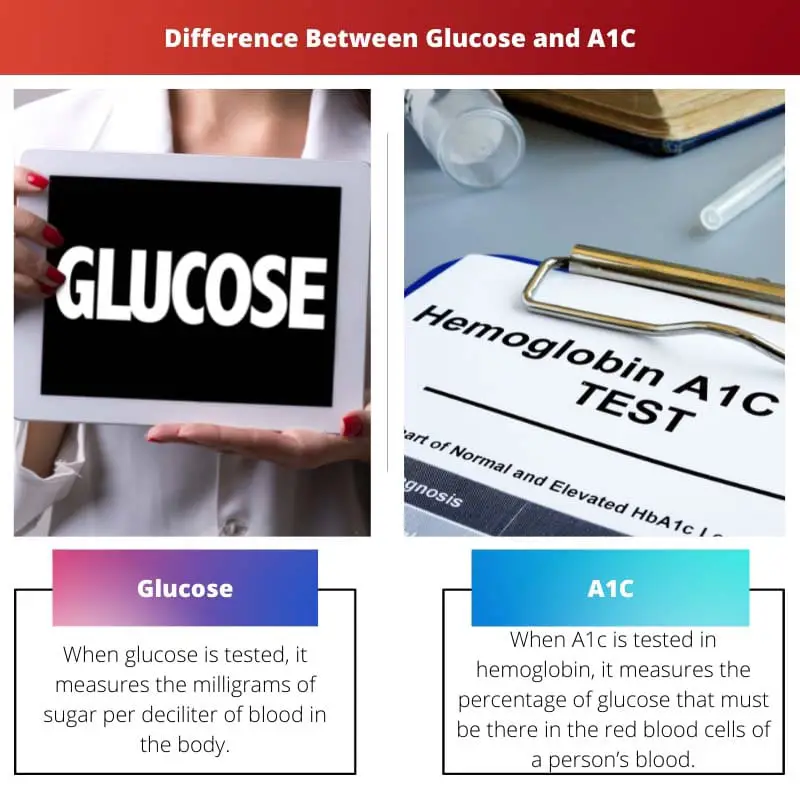There is a commendable debate between Glucose and A1c being the same, but there is no denying that they have differences that push them into separate zones despite their common grounds.
When compared between these two terms, glucose is referred to as blood sugar, which takes the same impact and can be equally distinguished from A1c. Glucose and A1c are measured in different ways and depend on each other on various levels. They are both checked in the body in terms of diabetes.
Key Takeaways
- A1C measures average blood sugar levels over the past 2-3 months.
- Glucose is a simple sugar used by the body as an energy source.
- A1C is more accurate in detecting diabetes as it measures long-term glucose levels.
Glucose vs A1C
Glucose is a type of sugar that is found in food and is the primary source of energy for the body’s cells. When we eat carbohydrates, our body breaks them down into glucose, which is then absorbed into the bloodstream. A1C, also known as glycated haemoglobin, is a blood test that provides an average of a person’s blood sugar levels over the past 2-3 months.

Glucose is checked in the body as it is important to know if the blood sugar in the body is too high, which causes hyperglycemia, or too low, which causes hypoglycemia, to avail the best treatment and care in time.
Various factors affect or trigger the body’s glucose level, like certain food items or beverage intake. It is mostly recommended that exercise and meditation help in bringing the sugar level down in the body before it takes any major hit or changes.
Glucose level is too impacted due to stress or certain illness. A1c is also referred to as haemoglobin A1c or Hba1c, which is taken as a test to determine diabetes in the early stages of the diagnosis. Unlike glucose, A1c is not influenced or affected every day by diet, stress, or exercise.
Hence, it is quite helpful to assume that A1c will give a good overview of a person’s diabetes level that can be managed over a period of time. When A1c is measured, it is done with blood in a lab, and we are recommended to do it twice a year. The A1c is measured in terms of percentage.
Comparison Table
| Parameters of Comparison | Glucose | A1C |
|---|---|---|
| Definition | When glucose is tested, it measures the milligrams of sugar per deciliter of blood in the body. | When A1c is tested in hemoglobin, it measures the percentage of glucose that must be there in the red blood cells of a person’s blood. |
| Glucometer | Glucose is checked in the body by using a blood sugar meter or glucometer. | In terms of checking A1c, a blood sugar meter cannot be used. |
| Fasting Before Test | Recommended fasting overnight before the test. | There is no need for fasting for the A1c test. |
| Measurement | Unit of Measurement for glucose is mg/dL. | The unit of measurement for A1c is a percentage. |
| Affects | Factors that can affect the Glucose test or glucose concentration in a person’s blood are medications, posture, acute stress, etc. | Factors that can affect the A1c test are kidney disease, liver disease, any recent blood loss. |
What is Glucose?
Glucose is associated with a blood sugar test that helps measure glucose concentration in the bloodstream. The choices of blood sugar are not limited to only blood, as glucose can be measured even in plasma or serum.
However, for glucose tests, blood plasma is mostly recommended since the nature of the specimen influences the glucose concentration in the bloodstream. The glucose meter measures the glucose in your blood plasma and shows its level in the person’s body.
When it comes to a normal glucose test, it is done by drawing the required blood plasma, and it is recommended to fast overnight. This issue makes the glucometer effective enough to work properly.
Despite its importance, too much high glucose in the blood can cause many health problems that can grow into bigger issues if not treated properly. Excess glucose in the blood is referred to as Hyperglycemia, which can damage the blood vessels that connect to important organs of the body.
Some health problems that can happen due to hyperglycemia are an increased risk of heart issues like stroke, kidney problems, and vision disability. During this period, neurological problems also became a problem.
However, apart from the normal glucose test that includes fasting, science has developed into having glucose tests without fasting at all. Random plasma glucose or RPG is one such glucose test.

What is A1C?
A1c, besides haemoglobin A1c, is also referred to as a glycosylated haemoglobin test and is a process of measuring the percentage of glucose in the blood that collides with the haemoglobin in the body’s red blood cells.
Typically, the A1c test shows or reflects the average blood sugar and its level over a small period, like 2-3 months. However, it is mentioned that the rising A1c doesn’t necessarily show diabetes always and rather shows a person’s excessive eating of sugar, starch content, or alcohol.
Usually, an A1c test is conducted to diagnose pre-diabetes or type 2 diabetes. This test doesn’t require overnight fasting or fasting of any kind and can be given at any point in time as an overall blood screening.
Haemoglobin is a protein found in the red blood cells of the body. As per scientific facts, it is due to haemoglobin that our blood is red, and its main role is to carry oxygen to all parts of the body.
When there is sugar in the blood, it is called glucose. When glucose develops in the blood of a human being, it binds with the haemoglobin present in the red blood cells.
This A1c measures the amount of glucose binding to the haemoglobin of the body. Some complications associated with a high level of A1c in the blood are heart diseases, nerve and kidney damage, and damage to many blood vessels of the body.

Main Differences Between Glucose and A1C
- The A1c test is known to measure the percentage of sugar in the blood that is binding to the red blood cells, whereas the glucose test is known to measure the milligrams of glucose per deciliter of the blood of a person.
- Blood sugar meters or glucometers can’t check sugar for the A1c test, But they can do a glucose test.
- The normal glucose test requires overnight fasting before the test, whereas the haemoglobin A1c test doesn’t require fasting and can be done anytime.
- In terms of the A1c test, some blood from the body is sent to the main lab for assessing it, whereas, in the glucose test, a drop of blood is squeezed into a strip that is sent to the lab.
- A1c test measures in percentage (%), whereas the glucose test is measured in mg/dL.

- https://care.diabetesjournals.org/content/33/1/61.short
- https://journals.sagepub.com/doi/abs/10.1177/193229680900300305

The importance of A1C in providing a long-term overview of diabetes levels and the minimal impact of daily factors on A1C levels is well elaborated in the article.
I agree, the article did a great job in explaining the significance of A1C and its relevance to diabetes management.
The article provided a clear comparison between glucose and A1C, explaining their differences and how they are checked in the body.
Agreed, the details about the measurement and effects on the body were very insightful.
Yes, I found the comparison very informative and well-explained.
The article’s focus on the impacts of high glucose levels and the health problems associated with it was particularly impactful and informative.
I found the mention of the neurological problems caused by hyperglycemia to be very educational and concerning.
The insights into the potential health risks that arise from hyperglycemia were crucial for raising awareness about the importance of managing blood glucose levels.
The article’s mention of glucose tests without fasting was particularly interesting and showcased advancements in medical testing methodologies.
I found the inclusion of random plasma glucose testing quite intriguing and reflective of innovative approaches to healthcare.
The article accurately highlights the differences in measurement, fasting requirements, and the importance of glucose and A1C in managing diabetes.
I appreciated the clear explanation of the comparison table and how glucose and A1C are affected by different factors.
The detailed exploration of hyperglycemia and its associated health risks was very informative and emphasized the importance of managing blood glucose levels effectively.
Agreed, the article effectively highlighted the potential health complications arising from hyperglycemia and emphasized its impact on overall health.
The insights into the consequences of hyperglycemia were compelling and underlined the significance of regular blood sugar monitoring.
The detailed explanation of what glucose is and its impact on the body’s health was really informative and eye-opening.
Yes, understanding the potential health risks associated with high glucose levels is crucial for early intervention and prevention.
I found the comparison of hyperglycemia and its health problems quite educational and relevant to real-life health concerns.
The article’s comparison table was particularly helpful in understanding the differences between glucose and A1C.
I found the structured comparison table very informative and easy to comprehend.
Agreed, the table made it easier to understand the nuanced differences between glucose and A1C measurement.
The explanation of how glucose tests are conducted and the significance of fasting for these tests was very enlightening.
I agree, the article provided a comprehensive understanding of how glucose tests work and why fasting is recommended.
The detailed explanation of the nature and purpose of glucose tests provided valuable insights into the significance of blood sugar measurement.
I agree, the clarity in explaining the glucose tests and their relevance to overall health was exceptional.